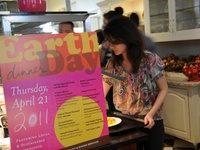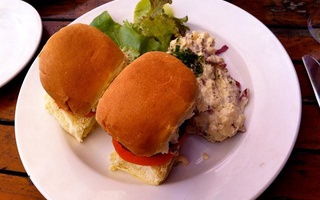
Laila Kasuri '13 browses the food line at Lowell Dining Hall last night. All dining halls served Sustainable Dinner, which featured entrees and side dishes made with local ingredients, in celebration of Earth Day 2011.
Undergraduate dining halls last night bustled with excited students browsing over buttered potatoes with sprinkles of parsley, cheddar and pepper jack cheese cubes on a wooden cutting board with crackers on the side, as well as an ice cream sundae bar with a flavor appropriately named “Green Monster.”
Harvard University Hospitality and Dining Services celebrated Earth Day last night with its annual sustainable dinner, which featured entrees and side dishes made with local, seasonal, and organic ingredients.
This year’s sustainable dinner included entrees that ranged from cider and thyme steamed mussels and carved herbed roasted chickens with a maple and shallot glaze to peppered turnips and lobster bisque.
In the Adams dining hall, Amol Pai ’13 tried to cool his steaming bowl of lobster bisque by blowing on it before bringing a spoonful to his mouth.
“It’s the best soup I had at Harvard,” Pai said, “It makes me feel like I just got out from my final exam.”
Multimedia
“It doesn’t get better than this,” Pai said. “The first spoonful [of the lobster bisque] made my legs melt.”
The sustainable dinner became an annual tradition in 2008 when University President Drew G. Faust announced Harvard’s commitment to a 30 percent reduction in greenhouse gas emissions by the year 2016.
The dinner reflects HUHDS’ “effort to celebrate the University’s overall green commitment,” said HUHDS spokesperson Crista Martin.
Although the actual Earth Day is today, Martin said HUHDS decided to serve Sustainable Dinner last night because dinner attendance on Friday is typically lower than other nights.
“We wanted as many people to enjoy this popular event as possible,” Martin said.
“Many people don’t connect food and sustainability,” Martin said. “We want to celebrate all that Earth Day represents by highlighting regional foods we enjoy regularly.”
Specifically for HUHDS, Martin said sustainability focuses on food that is grown or made locally.
Though Alexandra G. Mironov ’13 said the menu wasn’t too different from a normal day, she said she enjoyed the papardelle with brown butter roasted butternut squash and sage.
“It tasted fresh and not taken from a premade container,” she said. “It had fresh herbs and lots of flavor.”
Jakob O. W. Lindaas ’13, the Resource Efficiency Program representative for Adams, said all the ingredients for the night’s dinner are from within a 250 mile radius of Harvard.
“The idea behind local food is that it’s not only better for the environment since it travels less, but it’s also a way to support local economy,” Lindaas said.
HUHDS has taken several measures to promote sustainability in its kitchens and dining halls. For example, Dunster/Mather became the first commercial kitchen in the country to be LEED silver certified, while 12 of 13 residential dining halls compost pre- and post-consumer waste.
Depending on the season, 35 to 70 percent of produce provided in the dining hall is grown locally and HUHDS spends 25 percent of food budget on local goods.
—Staff writer Jane Seo can be reached at janeseo@college.harvard.edu.
Read more in News
New MCAT Means Few Changes


















